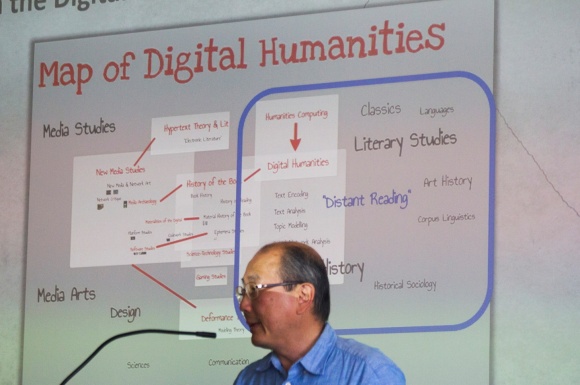In an eloquent and pragmatic blog post about building the UCL Centre for Digital Humanities, Melissa Terras stresses the importance of rooting a DH center in local institutional culture, in order to “link people” across the whole spectrum from arts and humanities to computer science and engineering. It’s an impressive achievement that has clearly fostered a lot of significant work at UCL, and it has started to change my own way of thinking about this perplexing phrase “digital humanities.”
In the past, I’ve tended to understand “digital humanities” as an abstract term. If you understand it that way, it’s easy to see that it covers a whole range of disparate things, which has sometimes led me to predict that it would fall apart in the near future into a bunch of separate projects.

If you understand DH abstractly, as a rubric covering many different projects, there’s a lot of it going on here at UIUC. On the west side of campus, we have a leading school of Library and Information Science (GSLIS), which regularly offers courses on digital humanities, and is one of two institutions piloting HathiTrust Research Center. At the north end of campus, we have the National Center for Supercomputing Applications (NCSA), which excels at providing computational support for the arts, humanities, and social sciences. The Colleges of Media, and Fine and Applied Arts, and Liberal Arts and Sciences are home to a lot of individual scholars pursuing research on or critique of digital media, and the campus as a whole hosts ambitious experiments like Learning to See Systems, that combine technological practice and theory.
On the other hand, we’ve never had a digital humanities center or curricular initiative. We have a program called I-CHASS, at NCSA, which provides computational support to scholars who need it (my own work would have been impossible without their support). And Scholarly Commons, at the Library, helps faculty and students find the resources and training they need. But we don’t have any center of the kind Melissa describes, tasked with building a bridge between all the different people mentioned above, and getting them in the same room.
One way to view this would be: we’re lagging behind. Digital humanities is getting organized at Berkeley and Stanford and Iowa and the University of Pennsylvania and Yale. From time to time I think “we need to get something moving.”
And from time to time I try. But I rapidly discover the size of this campus, and the huge range of digitally-human projects already scattered across it, already moving (quite successfully) in diametrically opposed directions — and it occurs to me, first, that it would take superhuman effort to herd them into the same room, and second, that maybe UIUC doesn’t have a digital humanities center because it doesn’t need one. I’m finding all the resources I need over at GSLIS and NCSA; other kinds of projects are also humming along; maybe we’ve never developed a single center precisely because our various distributed centers are so strong.
There are some drawbacks to this arrangement — mainly, that the strengths of the institution are not well-publicized either internally or abroad. For instance, I’m sure some grad students in the humanities here don’t realize that GSLIS regularly offers excellent courses in digital humanities. I’m writing this blog post partly in hopes of flagging that kind of local opportunity.
I think it’s even harder for undergraduates to envision creative connections between the humanities and other subjects without some kind of interdisciplinary program as a model. This is probably the biggest drawback of our distributed structure, and I do feel I should do something about it. But given the way my own interests fit into the local landscape, I suspect the wheel I can put my shoulder to may be an undergraduate program in data science rather than digital humanities. It seems increasingly possible to me that “digital humanities” — as such — may never take institutional form on this campus. By the time we organize that curricular space, it may be occupied by several distinct projects.
That possibility is making me reflect that public discussion of this topic (as skeptical and wide-ranging as it has been) may still have been too quick to assume we’re all moving in the same direction. William Gibson’s famous quip that the future is already here — but not evenly distributed — encourages us to imagine two possible futures for experiments like digital humanities: either they are destined to (eventually) get distributed everywhere, or they will turn out to have been blind alleys.
I think it’s pretty clear at this point that digital humanities is not a blind alley; there’s too much valuable research and teaching being done under that rubric in too many places, and momentum is continuing to build. But I also doubt its institutions — DH centers and curricula — will ever be evenly distributed. I suspect this is going to be one of those disciplinary spaces that different institutions handle differently even over the long run. In some places, the concept of “DH” may be exactly the seed crystal a local culture needs to bring people together. In other places, institutional DH may fail to coalesce, although — or even because — the interdisciplinary projects it would have organized are separately thriving.

2 replies on “Digital humanities might never be evenly distributed.”
[…] Ted Underwood on digital humanities and institutions. […]
[…] Digital humanities might never be evenly distributed […]